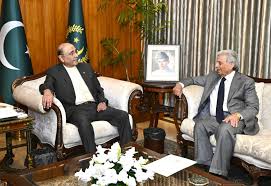Pakistan, China to push forward CPEC Action Plan at JCC meeting in Beijing on September 26

Celina Ali
Islamabad: Pakistan and China will hold the 14th meeting of the Joint Coordination Committee (JCC) on CPEC in Beijing on September 26, 2025, with a special focus on accelerating implementation of the China-Pakistan Action Plan (2025–2029).
Planning Minister Ahsan Iqbal announced the development while launching the Monthly Economic Development Update, highlighting that the four-year Action Plan, the first of its kind, represents a “solid step forward” in deepening strategic cooperation under the China-Pakistan Economic Corridor (CPEC) Phase II.
The minister told journalists here that the Action Plan aligns CPEC’s five development corridors with Pakistan’s URAAN 5Es initiative (exports, e-Pakistan, environment, energy, and equity), aiming to create a roadmap for inclusive, sustainable, and technology-driven economic growth.
“The upcoming JCC meeting will not just review progress but will chart a future course for expanding cooperation in industrialization, digital economy, agriculture modernization, energy transition, and human resource development,” Ahsan Iqbal said.
He also confirmed that Pakistan and China had signed new agreements to promote AI, robotics, renewable energy, and vocational training, including the NAVTTC-Hazza Institute of Technology Skills Pact in Beijing, which will create over 1,000 jobs in advanced sectors under CPEC.
Presenting the monthly update, Iqbal noted encouraging economic indicators. CPI inflation fell sharply to 3.5% in July–August FY2026 from 10.4% last year, while tax collection rose 14.1% to Rs 1,661 billion. The Pakistan Stock Exchange surged to a historic 154,277 points, with market capitalization reaching Rs 18.1 trillion, reflecting investor confidence boosted by Pakistan’s growing international trade ties, particularly with China.
Agricultural credit expanded by nearly 37% to Rs 232 billion, while private sector credit rose by 13% year-on-year to Rs 9.6 trillion, indicating stronger business activity. Meanwhile, development spending under PSDP increased by 23.3% to Rs 5.3 billion in the first two months, demonstrating improved project execution.
Ahsan Iqbal emphasized that CPEC Phase II is “people-centric”, with job creation, skills training, and entrepreneurship at its core. Initiatives like the URAAN AI Techathon and the Pakistan One National Business Plan Competition are expected to engage thousands of youth, startups, and entrepreneurs in IT, AgriTech, renewable energy, and manufacturing.
“CPEC is no longer just about infrastructure. It is about empowering people, building industries, and preparing Pakistan for the future economy,” the minister said.
The minister disclosed that discussions with Chinese leaders also covered cooperation in nuclear energy, space technology, astronaut training, and lunar missions, reflecting the broadening of Pakistan-China cooperation beyond economic connectivity into advanced scientific domains.
He also highlighted Pakistan’s vulnerability to climate change, noting that the 2025 monsoon floods killed 907 people and damaged critical infrastructure. Pakistan’s swift evacuation of 2.35 million people and the establishment of 1,744 relief camps showed the government’s resilience, but he stressed that collaboration with China on climate adaptation and green energy is crucial.
Diplomatic observers say the upcoming JCC meeting will test Pakistan’s ability to deliver on agreed reforms and projects under the Action Plan.
The meeting is expected to finalize timelines for new CPEC projects in energy, industry, and technology, while ensuring alignment with Pakistan’s long-term economic vision.
“China and Pakistan are moving from building roads and power plants to building capacity, technology, and resilience. This shift marks the true essence of CPEC Phase II,” an analyst commented.




